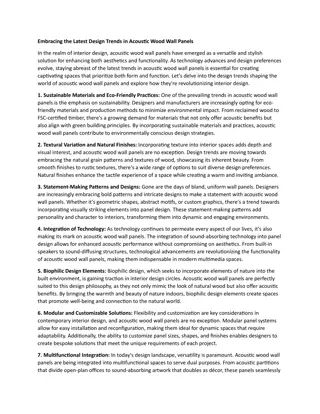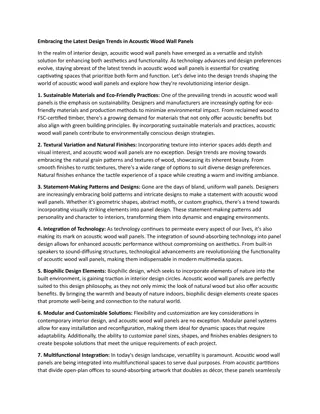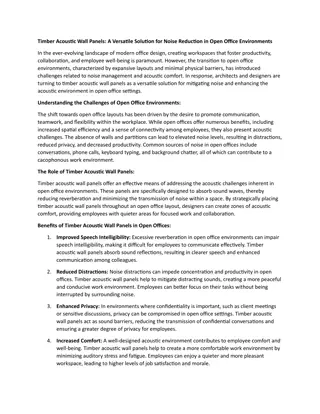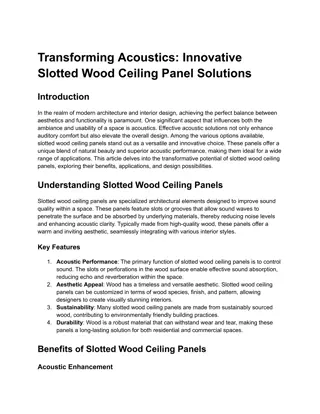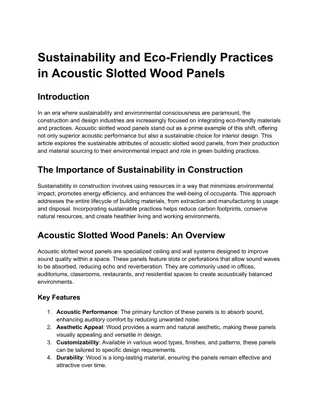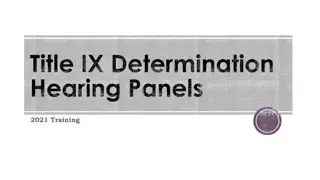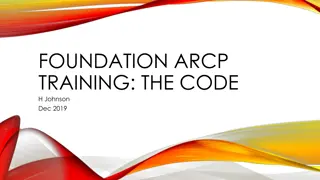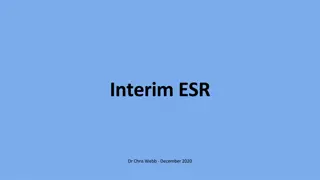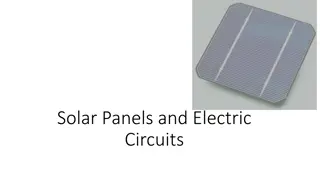
Understanding the Purpose and Process of an ARCP Panel in Medical Training
Dive into the essential functions of an ARCP panel, including evidence assessment, trainee progression evaluation, and revalidation advice. Explore the panel process, division of work, outcomes, and consequences for hospital trainees.
Download Presentation

Please find below an Image/Link to download the presentation.
The content on the website is provided AS IS for your information and personal use only. It may not be sold, licensed, or shared on other websites without obtaining consent from the author. If you encounter any issues during the download, it is possible that the publisher has removed the file from their server.
You are allowed to download the files provided on this website for personal or commercial use, subject to the condition that they are used lawfully. All files are the property of their respective owners.
The content on the website is provided AS IS for your information and personal use only. It may not be sold, licensed, or shared on other websites without obtaining consent from the author.
E N D
Presentation Transcript
PURPOSE OF AN ARCP PANEL Gold Guide p61: 7.54 Gold Guide p61: 7.54 1. To consider and approve adequacy of evidence, including ESR 2. To consider time out of training (TOOT) and determine whether extended time is required 3. To make a judgement about the trainee s progress and whether suitable to progress to the next level/CCT 4. Provide advice to the Responsible Officer about revalidation 5. To give feedback to Educational and Clinical Supervisors on their performance
ARCP PANEL PROCESS Chair introduction and scene setting Dividing up the work Deciding the outcome Questions for interviewing the trainee ARCP Form and Form R Notifying the trainee and TPD ES feedback
Dividing up the work Dividing up the work There is a lot to be reviewed for an annual panel, and it is most efficient if the areas to be reviewed are divided up amongst the panel members. One person will be asked to complete the checklist, but that person can also look at some areas of the review. One member may be asked to look at all the Forms R. These are mandatory and failure to submit one will result in an unsatisfactory outcome (albeit temporary q.v.). Chair introduction and scene Chair introduction and scene setting Most chairs will introduce the way they would like to organise the panel review of the evidence. They may give a flavour of the day to come, if they have prepared in advance. They may check that all members have been trained and answer any queries or concerns. setting Deciding the Deciding the outcome This is by consensus, and will usually be fairly clear by the end of the review. The Gold Guide states very clearly that the outcome must be decided before interviewing the trainee. The interview is for informing the trainee of the outcome and talking through the plan for the next period/ year. outcome Questions for the interview: Questions for the interview: Most chairs will ask panel members what they would like to ask, and may suggest questions. It is usual for lay members to ask questions about pastoral issues, and also sometimes questions concerning patient perspectives. It is essential to ask out about mitigating circumstances sometimes trainees do not share these until the panel. It is also good practice to ask about support and training in their placement. ARCP Form: ARCP Form: The chair will complete the ARCP form including ticking a box about concerns for the RO. The chair will sign off the form if appropriate using a different log-in Notifying the trainee: Notifying the trainee: once the form has been signed by the chair, it is present on the trainee s e-portfolio. The Admin team will send an email to the trainee, and the TPD as well.
ARCP OUTCOMES Hospital trainees only Hospital trainees only
OUTCOMES AND CONSEQUENCES 1 Carry on to next ST year, or within year if LTFT or out of sync 2 Likely to have objectives, checked at another ARCP panel in 3-6 months 3 Extension awarded with objectives, and review before or at the end of it 4 Removal of NTN. Appeals process available, careers advice, potential for some to use CEGPR to get licence to practise as a GP 5 Trainee to account to panel within 5 days. Panel considers evidence (usually virtually) once provided and awards new outcome. 6 Trainee applies for CCT via RCGP and GMC 8 Out of programme. No review, but need to make sure all training in the year reviewed at the next ARCP panel and note of this made.
REVIEWING THE EVIDENCE Previous ARCP Previous ARCP any recommended actions? any recommended actions? View the latest ESR: page 1 Competence Areas View the latest ESR: page 1 Competence Areas Posts check (should have been done and entered on checklist) Trainee self-rating ES Ratings Page 2 is Page 2 is curriculum curriculum coverage coverage Page 3 is Page 3 is Skills Log Skills Log (will disappear in August 2015) (will disappear in August 2015) Page 4 is Page 4 is Workplace based assessment Workplace based assessment
QUALITY & PROGRESS: HOW TO JUDGE Ratings and linked evidence Ratings and linked evidence ES summary boxes ES summary boxes MSF & PSQ MSF & PSQ Assessments Assessments dip in CSR CSR Learning logs Learning logs PDP PDP Educators Notes Educators Notes dip in
MSF & PSQ MSF Useful marker MSF Useful marker Look at scores and comments Look at scores and comments Early evidence links scores to outcomes at MRCGP Early evidence links scores to outcomes at MRCGP PSQ less useful PSQ less useful Low scores more useful Low scores more useful
ASSESSMENTS Dip in Dip in Are the ratings congruent with the Competence ratings? Who has done them? Trainer/ Clinical supervisor/ OOH CS/ Peers CSR CSR Look at any since last ARCP Sometimes helpful Essential for assessing short posts
LEARNING LOG & REFLECTION Can you tell what the trainee learned and why? Can you tell what the trainee learned and why? Can you see how it may change their practice? Can you see how it may change their practice? Are additional learning needs identified? Are additional learning needs identified? Is there a plan for meeting them? Is there a plan for meeting them? Is the entry simply a journalistic log of what happened? Is the entry simply a journalistic log of what happened? Breadth and Depth Breadth and Depth Enough Clinical Encounters? Check certificates for CPR and Child Safeguarding (or use key word box to search) Numbers Numbers: quality trumps quantity : quality trumps quantity Rating guide Rating guide
PDP Is the trainee using it? Is the trainee using it? Are objectives SMART? Are objectives SMART? Out of date objectives? Out of date objectives? Do the objectives seem appropriate? Do the objectives seem appropriate? How has the ES commented on its quality? (P4 of ESR) How has the ES commented on its quality? (P4 of ESR)
EDUCATORS NOTES Rich source of information Rich source of information Look for sick leave dates Look for sick leave dates Look for evidence of problems/ concerns Look for evidence of problems/ concerns Look for reminders to engage Look for reminders to engage Look for praise and positive feedback Look for praise and positive feedback
OVERALL SENSE OF PROGRESS If the ES has done a good job, and you are confident that his/her If the ES has done a good job, and you are confident that his/her judgements are sound, and the trainee is doing well, then you judgements are sound, and the trainee is doing well, then you can just dip into these areas quickly. can just dip into these areas quickly. If you have doubts about the ES performance, then you will need to If you have doubts about the ES performance, then you will need to look more closely. look more closely. This is also true if there are concerns about the trainee s progress. This is also true if there are concerns about the trainee s progress.








